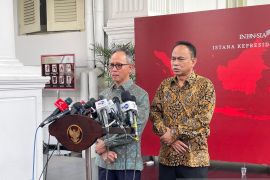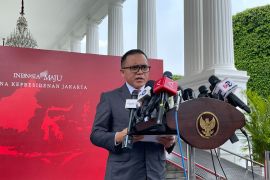"The government has allocated Rp1 trillion for improvement of prison facilities in this country. I want to get an immediate report on what has been done with that amount of money. If the fund is insufficient, the government is ready to increase it,"Jakarta (ANTARA News) - Two jailbreaks that happened in Sumatra in July alone have exposed how poor and vulnerable the condition of Indonesia`s overcrowded prisons.
The incidents prompted the government to allocate funds to build new prisons and review its policies on treatment approaches for drug addiction.
The first prison break occurred on July 11, 2013 at the Tanjung Gusta Penitentiary in Medan, North Sumatra, where 212 prisoners, including 22 terrorists, escaped and five people, which consisted of three prisoners and two prison guards, were killed.
"It is estimated around 200 prisoners have broken out of the jail including the 22 terrorism prisoners. Right now police are still chasing them," spokesman of the National Police Brigadier General Boy Rafli Amar said in Jakarta recently.
The break-out happened as prisoners rioted in protest at electricity and water stoppages at the facility, which is overcrowded.
Police managed to recapture about 105 of those escapees but were still searching for the remaining escapees, including four terrorists.
The penitentiary had 2,600 inmates when the incident happened, while its actual capacity is only 1,054 prisoners, said Akbar Hadi, the chief spokesman of the justice and human rights ministry`s directorate general of correctional institutions.
The second prison escape happened on July 17, 2013, when 12 prisoners accused of drug offenses broke out of a jail on the island of Batam, Riau Islands Province.
Police said the inmates used iron bars from their beds to beat up a prison guard and break a window in the warden`s office before fleeing the overcrowded prison.
The Batam jail has a capacity of 250 inmates but was holding about 400. The prison was reportedly overcrowded and often flooded during rains.
The Batam police have launched an operation to recapture the drug suspects and so far managed to apprehend at least three of them.
Overcapacity has been blamed as one of the factors causing the jailbreaks. The majority of the prisoners are drug users.
Indonesia is believed to have imposed the strictest anti-drug laws in the world. The country has enacted laws and regulations mandating that all drug offenders be sent to rehabilitation centers, but law enforcers often charge them with drug possession and put them in detention facilities, instead of sending them to rehabilitation centers.
"Though the spirit of the 2009/2013 Narcotics Law is not to criminalize drug users, the implementation of the law has been flawed," said Edo Nasution, the National Coordinator of the Indonesian Network of People Who Use Drugs (PKNI), as quoted by the media. He said around 42 percent of Indonesian prisoners are drug users.
Following the jail rioting, President Susilo Bambang Yudhoyono ordered an investigation of the tragedy.
"The President has ordered an in-depth investigation to establish the motive behind the rioting at the Tanjung Gusta correctional facility. National Police chief Gen. Timur Pradopo himself has appointed any of his officers to conduct the in-depth investigation," Coordinating Minister for Political, Legal and Security Affairs Djoko Suyanto said in a press conference recently.
"Because the prison is overcapacity, Deputy Minister of Law and Human Rights Denny Indrayana has been asked to remove some of the inmates to other correctional facilities," he said.
The minister also asked the justice minister to increase security control at prisons following recent jailbreaks.
The head of state ordered an allocation of funding for improvement of jail facility in the country.
"The government has allocated Rp1 trillion for improvement of prison facilities in this country. I want to get an immediate report on what has been done with that amount of money. If the fund is insufficient, the government is ready to increase it," Yudhoyono said.
The government have been constructing 40 new prisons to accommodate all prisoners. "19 of them have been operating and the rest is expected to be operational soon," Wibowo Joko Harjono, the director of order and security development of the directorate general of penitentiaries, said.
He said the capacity of prisoners in the country at present is only for 91,000 people but the number of prisoners accommodated there right now reached 126,000.
"Almost all prisons especially in big cities have been overcapacity. So, new prisons are needed," he said.
Meanwhile, Justice and Human Rights Minister Amir Syamsuddin was of the opinion that releasing drug addicts from prison and placing them in rehabilitation programs can reduce overcrowding in the country`s prisons.
He said this option was more rational than just building more new prisons. The minister said prisons should be for drug dealers or producers, not just addicts, especially the young.
The minister said 56,000 out of 117,000 inmates in prisons throughout the nation were on drug charges and many of them were just drug addicts. Therefore, he added, if the government managed to come up with a new regulation that would split drug users from dealers, it would reduce the number of inmates significantly.
Supporting the minister`s view, Deputy Justice Minister Denny Indrayana said sending drug addicts to jail could hurt the user`s health, hindering their chances for recovery as well as crowding prisons and detention centers.
According to the deputy minister, drug offenders make up more than 40 percent of the 150,000 people detained in Indonesian jails.
All of the country`s prisons put together only have a capacity for 10,500 inmates, meaning they are holding 15 times more inmates than they should, he said.
The number of the country`s prisoners could increase if law enforcers continue to put drug offenders behind bars. According to a 2011 survey by the National Narcotics Agency (BNN), there are 3.8 million to 4.2 million illicit drug users in Indonesia.
President Yudhoyono in his remarks during the International Day Against Drug Abuse and Illicit Trafficking which falls on June 26, stated that "the solution [for drug users] is not jail, but rehabilitation. The concept should not be one of punishment, but of salvation." (*)
Reporter: Fardah
Editor: Heru Purwanto
Copyright © ANTARA 2013












